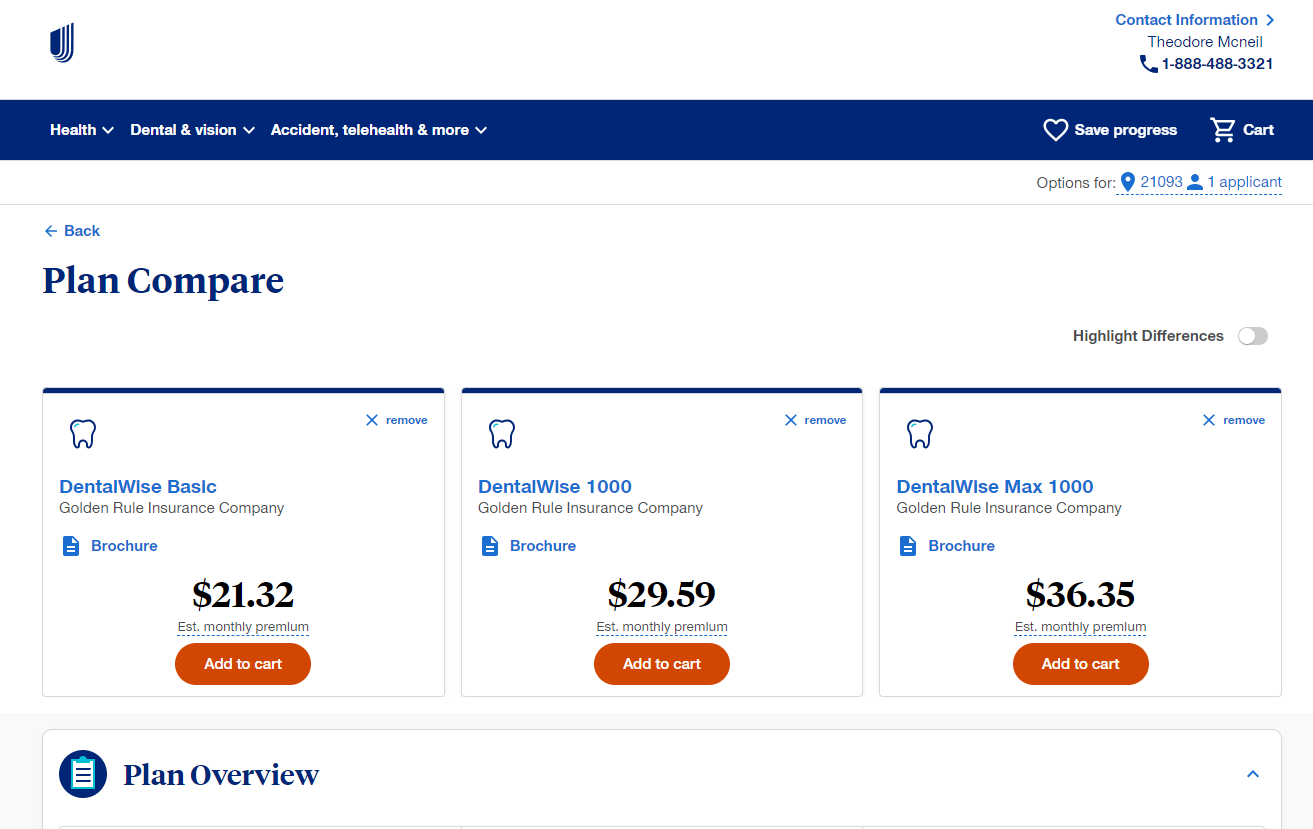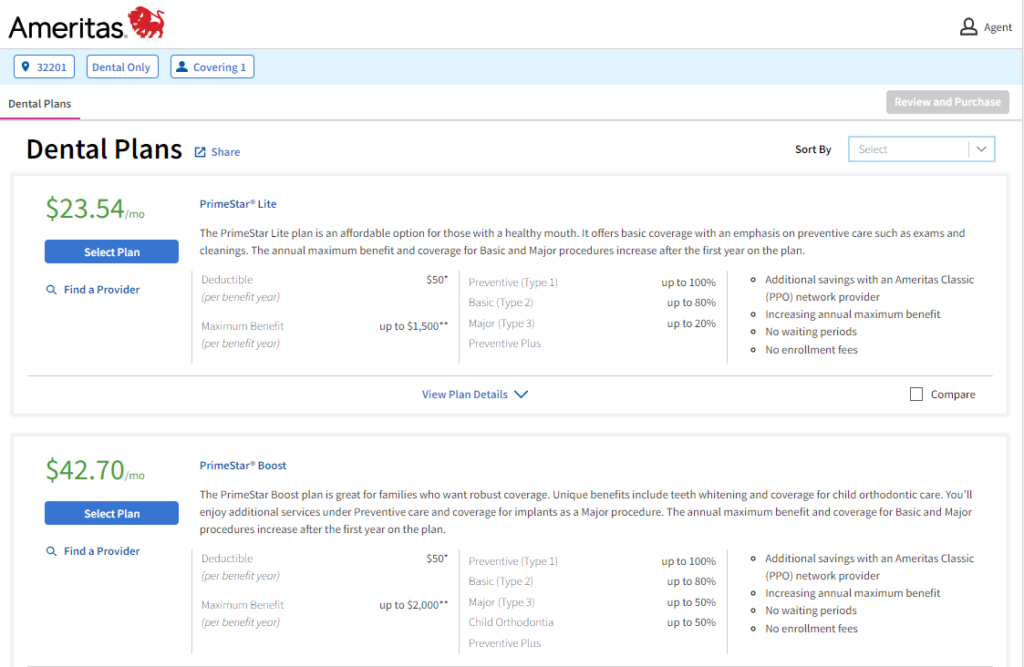A single tooth implant can restore your smile and improve your oral health. However, the cost can vary significantly depending on whether you have dental insurance.
This article will explore the average costs of single tooth implants with and without insurance, factors that can affect the price, and financing options to help you afford this investment in your oral health.
On average, a single tooth implant can cost anywhere from $3,000-$5,000. This is a good estimate of what it will cost out-of-pocket without insurance.
Understanding the factors that influence the cost of a single tooth implant can help you plan and make informed decisions.
Questions? Speak to a licensed agent and get free personalized help!
Your privacy is our priority. We don’t store personal information or process payments, ensuring a safe and secure experience.
We earn revenue from partners and advertisers. For more information >
FEATURED
- Up to 150% more effective than floss for healthier gums
- Unique Quad Stream creates four wide streams of water for a thorough clean between teeth and along the gum line
- Cordless with 14-day battery life for ultimate convenience, can be used in the shower
What Is a Single Tooth Implant?
Dental implant surgery is a procedure where metal posts are surgically placed into the jawbone to replace missing tooth roots.
These posts serve as anchors for artificial teeth, which are attached later.
The surgery enhances both the appearance and functionality of the smile, allowing individuals to eat, speak, and laugh confidently.
A single tooth implant is a dental restoration designed to replace a missing tooth by surgically implanting an artificial tooth root into the jawbone.
Furthermore, a single tooth implant can help maintain the structure of your jawbone by stimulating bone growth and preventing bone loss, which can occur when teeth are missing.
This improves your oral health and helps preserve your facial structure.
This dental procedure involves multiple steps and materials to create a natural-looking and functional replacement tooth. Understanding the steps involved can help answer:
“Why is a single tooth implant so expensive?”
Tooth Extraction
If the missing tooth persists, extraction may be necessary before implant placement. This step ensures adequate space and support for the implant within the jawbone.
Additionally, bone grafting might be recommended to augment the jawbone, providing a stable foundation for the implant.
Bone Grafts
Your dentist might suggest a bone graft to enhance the healthy bone quantity at the implant site. Typically, this graft is performed concurrently with tooth extraction to preserve the site for the forthcoming implant.
Alternatively, it may be necessary after prolonged tooth absence and subsequent bone loss. Various bone graft materials are available, with the selection discussed with you before the procedure.
Post-placement, the bone graft requires time to heal before implant placement.
Implant Placement
Upon complete healing of the extraction site, the implant placement procedure is initiated.
During this surgical process, a dental implant, usually composed of titanium or a titanium alloy, is surgically inserted into the jawbone.
Functioning as an artificial tooth root, the implant integrates with the surrounding bone through osseointegration, offering stability and support for the replacement tooth.
Healing
Following implant placement, a healing phase ensues to enable full osseointegration of the implant with the jawbone. Typically spanning several months, this period facilitates bone cell growth and adherence to the implant surface, securing it in place. Temporary restorations may be employed during this interim to uphold aesthetics and functionality.
Abutment Placement
Upon completion of osseointegration, an abutment—a small connector—is affixed to the implant. Made of metal or ceramic, the abutment links the implant to the final restoration.
It protrudes above the gumline, furnishing a sturdy foundation for the replacement tooth.
Replacement Tooth
Once the abutment is secured, impressions of the abutment and adjacent teeth are taken to fabricate the final replacement tooth.
Typically a custom-made dental crown, this restoration is crafted to mimic the size, shape, and color of neighboring teeth, ensuring a harmonious and natural appearance.
Final Restoration
With the replacement tooth fabricated, it is affixed to the abutment using dental cement or a screw.
The dentist meticulously adjusts the fit and bite of the restoration to ensure optimal comfort and functionality.
Upon completion, the single tooth implant delivers a durable and aesthetically pleasing solution for tooth replacement.
Overall, dental implants offer many benefits beyond aesthetics, making them a worthwhile investment — but they can be costly.

Average Single Tooth Implant Cost Without Insurance
Dental implants are considered one of the most effective and durable solutions for replacing missing teeth, but they are not cheap and may require financial planning — especially if you need more than one.
We partnered with Ameritas Dental & UnitedHealthcare to illustrate the cost of a single tooth implant cost across several major cities.
The price for a tooth implant will also depend on the dentist you choose and the complexity of the procedure.
On average, the cost of a single tooth implant can range from $3,500-$5,000 without insurance and that’s with no issues or complications. Clearly, the cost of a tooth implant without insurance can be a significant investment in your oral health and overall happiness.
Plus, prices can vary a great deal. The average cost for a single tooth implant in Florida is different than in Virginia, Kentucky or New York City.
How Much Does A Single Tooth Implant Cost Without Insurance Near You?
The cost of a single tooth implant can vary depending on various factors, including the experience of the dentist, the materials used, and any additional procedures required.
The cost of a single tooth implant without insurance can vary by a few hundred to thousand dollars based on geography alone. It’s essential to research and compare prices from different dental providers near you to ensure you’re getting the best value for your investment.
These are for illustration only. Your rates will vary:
| ZIP | City | Estimated Cost |
|---|---|---|
| 23223 | Richmond | $3,700-$4,500 |
| 19101 | Philadelphia | $4,500-$6,000 |
| 28203 | Charlotte | $4,000-$4,900 |
| 75201 | Dallas | $4,000-$5,000 |
| 33592 | Tampa | $4,000-$4,900 |
| 30306 | Atlanta | $4,800-$6,000 |
| 92102 | San Diego | $4,300-$5,100 |
| 60601 | Chicago | $4,300-$5,200 |
| 70112 | New Orleans | $3,500-$4,300 |
| 38107 | Memphis | $4,000-$5,000 |
| 21202 | Baltimore | $4,000-$4,700 |
Source: Ameritas & UnitedHealthcare
Lower the Cost of a Single Tooth Implant
As you know by now, implants can be expensive. Private dental insurance can help. Insurance won’t pay 100% but it is designed to save you money if you plan in advance.
For example, if the cost for dental implants is $4,000 then a $30-$40 a month dental insurance plan might be worth it.
Keep in mind, most dental insurance plans have waiting periods — some do not. (see below)
Unlike ACA Marketplace coverage or group benefits from an employer that has enrollment periods, you can sign up for individual dental insurance any time of the year online in just a few minutes.
If you’re self-employed, a small business owner, retiree or anyone looking to close a coverage gap, individual dental insurance is a smart choice once you do the math.
Knowing what dental implants cost can help you determine if insurance is worth it and how much you’ll save.
Almost all dental insurance plans include annual exams, cleanings and x-rays. Using a network dentist can save you 50%-80% on other procedures like fillings, extractions and dentures.
Investing in dental implants can be a life-changing decision, but how can you save money?
While the cost of a single tooth implant may seem daunting, there are several strategies you can use to lower the overall expense.

Dental Insurance
If you have dental insurance, check your coverage to see if it includes dental implants. Some insurance plans may partially cover the cost of implants, reducing your out-of-pocket expenses.
If you don’t have dental insurance, start a free quote and find a plan & dental implant specialist near you. Compare the cost and benefits of the plan with the cost of a single tooth implant without insurance.
Remember to evaluate if there is a waiting period and the annual maximum benefit. This amount can be $1,000-$3,000 depending on the plan you choose.
RELATED: “Marketplace Dental vs. Off-Exchange Dental: Which Is Better?”
Payment Plans & Financing
Many dental practices offer payment plans or financing options to help make the cost of implants more manageable. These plans allow you to spread out the cost of treatment over time, making it easier to fit into your budget.
Dental Schools
Dental schools often offer discounted rates for dental procedures, including implants, performed by dental students under the supervision of experienced faculty. While the treatment may take longer, it can be a more affordable option for those on a tight budget.
Shop Around
Don’t be afraid to shop around and get quotes from different dental providers. Comparing prices can help you find a competitive rate without compromising on quality.
Questions?
Speak to a licensed expert by phone, email or chat absolutely free. Agents are available in:
FL, GA, MD, MS, NC, PA, SC, TN, TX, VA
Your privacy is our priority! We don’t share personal information or collect payments, ensuring a safe and secure experience.


UnitedHealthcare dental plans provide flexible options for basic and major dental services with no age limit, no waiting period, Day 1 coverage and increasing benefits.
Preventive, basic and major services covered. Annual maximums from $1,000-$3,000.
- DentalWise 1000
- DentalWise Max 1000 (vision & hearing)
- DentalWise Max 2000 (covers implants with an additional $1,500 benefit!)
- DentalWise Max 3000 (covers implants with an additional $1,500 benefit!)
Online quoting and enrollment are available in licensed states:
FL, GA, MD, MI, MS, NC, PA, SC, TN, TX, VA
Read the policy before purchasing or contact us for help.

Available: FL, GA, MD, MI, MS, NC, PA, SC, TN, TX, VA

Ameritas dental insurance plans feature next-day coverage, no enrollment fees with increasing benefits.
Online quoting and enrollment!
No waiting periods for preventative, basic & major work. Vision & hearing available in select states.
- PrimeStar Lite
- PrimeStar Boost
- PrimeStar Complete
- Annual maximums from $1,500-$3,000
- Increasing benefits
- Child orthodontia
Read the policy before purchasing or contact us for help.

Available: FL, GA, MD, MI, MS, NC, PA, SC, TN, TX, VA
FEATURED
- FOR HEALTHIER GUMS IN JUST 1 WEEK remove 100% more plaque* with ORAL-B’s MOST ADVANCED TECHNOLOGY *vs a manual brush
- PROTECT YOUR GUMS WITH iO PRESSURE SENSOR, Oral-B’s only one to signal if you are applying the PERFECT PRESSURE for an effective and safe clean
- Always MAXIMIZE YOUR CLEAN with iO LIGHTRING TIMER -that celebrates a dentist recommended 2-minute brush- and REFILL CHANGE ALERT
Last update 2024-11-04. Amazon Associates earn from qualifying purchases.

